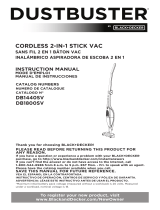
fire, electric shock or electrocution.
a. Two-wire cords can be used with 2-wire or 3-wire extension cords.
Only round jacketed extension cords should be used, and we
recommend that they be listed by Underwriters Laboratories
(U.L.). If the extension is to be used outside, the cord must be
suitable for outdoor use. Any cord marked for outdoor use can
also be used for indoor work. The letters “W” or “WA” on the cord
jacket indicate that the cord is suitable for outdoor use.
8. Use only the supplied charger when charging your tool. The use of any
other charger could damage the tool or create a hazardous condition.
9. Use only one charger when charging.
10. Do not attempt to open the charger. There are no customer serviceable
parts inside. Return to any authorized Black & Decker service center.
11. DO NOT incinerate the tool or batteries even if they are severely
damaged or completely worn out. The batteries can explode in a fire.
12. Do not incinerate the battery even if it is severely damaged or is
completely worn out. The batteries can explode in a fire. Toxic fumes
and materials are created when lithium ion batteries are burned.
13. Do not charge or use battery in explosive atmospheres, such as
in the presence of flammable liquids, gases or dust. Inserting or
removing the drill from the charger may ignite the dust or fumes.
14. If battery contents come into contact with the skin, immediately
wash area with mild soap and water. If battery liquid gets into the
eye, rinse water over the open eye for three minutes or until irritation
ceases. If medical attention is needed, the battery electrolyte is
composed of a mixture of liquid organic carbonates and lithium salts.
WARNING: Burn hazard. Battery liquid may be
flammable if exposed to spark or flame.
Charging Procedure
The battery needs to be charged before first use and whenever it
fails to produce sufficient power on jobs that were easily done before.
When charging the battery for the first time, or after prolonged storage,
it will only accept an 80% charge. After several charge and discharge
cycles, the battery will attain full capacity. The battery may become
warm while charging; this is normal and does not indicate a problem.
WARNING: Do not charge the battery at ambient
temperatures below 36° F (2°C) or above 104°F (40°C).
6
Recommended charging temperature:
Approximately 75°F (24°C).
• Note:Thechargerplugincorporateslockoutsto
prevent the use of incorrect chargers. The plug
must be correctly oriented when inserted.
• Insertthechargerplugintothecharger
connector at the rear of the tool (fig. A).
•Plugthechargerintoa120Voutlet.
•Chargethetoolfor16hoursbeforefirstuse.
For catalog numbers GSL35, GSL75:
• Thechargerindicatorlightwillcomeonindicatingthatthetoolischarging.
• Whenthechargeiscompletethelightwillgoout.
For catalog numbers GSN30, GSN32, GSN35:
• Thechargerindicatorlightwillcomeonindicatingthatthetoolischarging.
• The light will stay on as long as the charger is connected to the
tool and plugged into a working outlet.
•ItWILLNOTflash,orgooutwhenthechargingcycleiscomplete.To
maximize the lifetime of the battery, it is recommended to keep the battery
connected to the charger whenever the tool is not in use. When the battery is
full, the power consumption of the charger is negligible.
Important Charging Notes
1. After normal usage, your tool should be fully charged in 3 to
9 hours. Your tool was sent from the factory in an uncharged
condition. Before attempting to use it, it must be charged for at
least 9 hours.
2. DO NOT charge the batteries in an air temperature below 40°F
(4,5° C) or above 105°F (40,5 °C). This is important and will
prevent serious damage to the batteries. Longest life and best
performance can be obtained if batteries are charged when air
temperature is about 75°F (23,8° C).
3. While charging, the charger may hum and become warm to touch.
This is a normal condition and does not indicate a problem.
4. If the batteries do not charge properly—(1) Check current at receptacle
by plugging in a lamp or other appliance. (2) Check to see if receptacle
is connected to a light switch which turns power off when you turn out
the lights. (3) Move charger and tool to a surrounding air temperature of
40°F (4,5° C) to 105°F (40,5° C). (4) If the receptacle and temperature
are OK, and you do not get proper charging, take or send the tool and
charger to your local Black & Decker service center.
A









